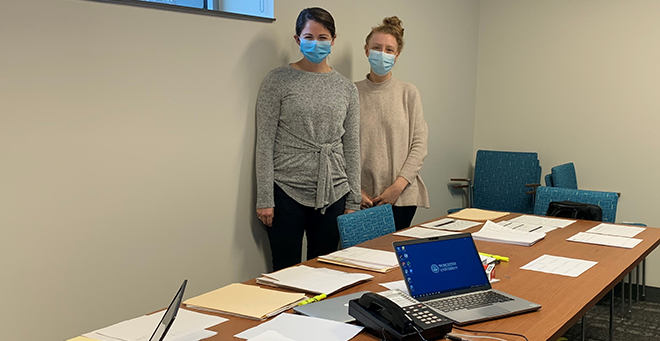Two Graduate School of Nursing DNP candidates have stepped up to help a college community stay protected from the coronavirus. Kelly Cutting, RN, FNP-C, and Olivia Slezik, RN, AGPCNP-BC, both graduating in 2021, are aiding COVID-19 tracing efforts for Student Health Services at Worcester State University.

“Both of us did our nurse practitioner clinicals at Worcester State, so the staff there reached out to us,” said Cutting.
“Although there are many fewer people at the school and we’re seeing less traffic at the student clinic, the administration is taking on contact tracing for the entire student population,” said Slezik. “Our role is to help oversee the organization and keep track of positive cases.”
Several times a week, Cutting and Slezik report to a campus conference room and get to work. A typical day includes making phone calls to COVID-positive students and analyzing charts that outline where a student is quarantining, whether or not they have symptoms, who they’ve come in contact with, and what their next steps should be. If a positive student was present in a classroom, Cutting and Slezik inform university administration to initiate a proper cleaning of rooms.
“We’re in touch with students who are in close contact within their dorms or apartments, in quarantine or have possibly been exposed, and those who have the virus and need to remain isolated,” said Slezik. “We have dozens of folders of paperwork that help us monitor an individual’s activity so we can give them instructions and try to slow the spread.”
“A lot of our work involves navigating students and staying ahead of them. There’s a spectrum of students ranging from some who are truly concerned about the situation and some who are not so fearful. There are some students who won’t even answer our calls because they want to do what they please. It is on us to educate to the best of our ability so we can keep our community safe,” said Cutting.
Cutting and Slezik alternate on-call weekends in the event that a student needs to be contacted immediately. Stepping into these roles has provided valuable new experiences for the students, including introducing them to the managerial aspects of nursing and allowing them to practice establishing personal connections.
“We do our best to decipher what kind of support a student needs, especially if they’re nervous, symptomatic or perhaps do not have resources,” said Cutting. “It can be challenging but it’s opened our eyes to the ways we can interact with patients on a personal level. This just shows us that our role as nurses is truly critical in this time.”
“The circumstances can spiral, especially because the trail of contact can be as small as one or two people or as great as 15 people,” said Slezik. “While we aren’t conducting tests, our involvement is giving us a glimpse of health care from a remote setting and teaching us new ways to apply our skills.”